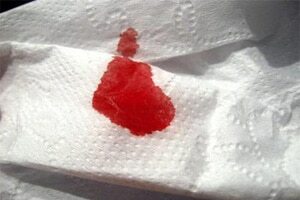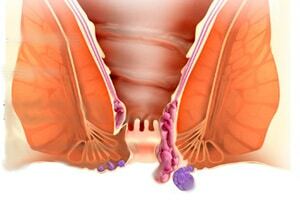In healthy people, defecation occurs 1-2 times per day. In this case, the excreta excreted are characterized by a soft texture, light or dark brown hue and a cylindrical shape. If the men have blood during defecation, then it is necessary to undergo a medical consultation, because this phenomenon refers to dangerous pathological signs, even if the bloody veins in the feces appeared only once.

Common causes of blood in the feces of
Anal bleeding can be of a diverse nature from mild to abundant blood impurities on feces. Still need to consult a proctologist, because the reasons for such a factor can be very different - from anal fissure or hemorrhoidal inflammation to oncology of the intestine or prostate. Blood during defecation can serve as a symptomatic manifestation of a variety of pathological conditions.
- Anal fissure. Bloody discharge is insignificant and appears after the end of the defecation process. Along with blood, the patient is troubled by a burning sensation and soreness in the anus. And bloody impurities can be found on paper or on feces, but there is no mixing with excrement.
- Inflammation of hemorrhoids or hemorrhoids. A similar case is characterized by the fact that bloody impurities are found after feces. Blood with excrement does not mix, appearing scarlet spots on their surface. Ulcerative pathology of the duodenum or stomach. Similar diseases are accompanied by a tar-like consistency of stool with heavy bleeding. In addition, the patient is worried about vomiting with bloody impurities.
- Diverticular formations. These are peculiar protrusions or recesses on the vessels of the intestinal walls. When their integrity is violated, excrement is formed, mixed with bloody veins.
- Polyposical formations. The severity of blood in the feces depends on the parameters and localization of the polyp. But usually there is a mixture of blood inclusions with the masses of excrement.
- Proctitis. Mucocutaneous rectal shells under a number of negative factors ulcerate and become inflamed, which is accompanied by bleeding. Bloody clots in stool are mixed with mucus.
- Rectal oncology. This symptom, like bleeding, with intestinal cancer resembles the excretion in the feces of blood in polyposic formations.
- Gastrites of any etiology are also often accompanied by anal secretions of blood. In this case, the feces are of a decorated character, they show abundant admixtures of blood clots.
- Ulceration and inflammation of the colon( colitis) also differ in secretion during stool defecation, mixed with mucus and spotting.
- With certain pathologies of a systemic nature, blood is also detected during defecation.
Often bloody impurities on stool appear and with other pathological conditions, leading to changes in the structure of the digestive system.
As indicated by bloody impurities with defecation
 For different reasons of the pathological process, the nature of the appearance of blood will also be different. In the presence of tumoral processes in the upper intestinal region, diverticulosis or polyposis in normally formed feces, the male will detect bloody veins. If the patient is concerned about bloody diarrhea, then most likely he has an intestinal infection like amoebiasis or dysentery, and such a picture can also occur with helminthiasis.
For different reasons of the pathological process, the nature of the appearance of blood will also be different. In the presence of tumoral processes in the upper intestinal region, diverticulosis or polyposis in normally formed feces, the male will detect bloody veins. If the patient is concerned about bloody diarrhea, then most likely he has an intestinal infection like amoebiasis or dysentery, and such a picture can also occur with helminthiasis.
Threaded blood stains on feces appear in the presence of vascular intestinal pathologies. If the excrement becomes a cherry color, then a similar fact indicates intense intense bowel bleeding. If the blood is scarlet, drip and with no mucous impurities, then such a sign indicates the development of hemorrhoids. And when the hemorrhoidal process is started on feces, in addition to blood, purulent-mucous fractions are also found.
Diagnostic procedures
Not having a medical education it is rather difficult to determine a reliable diagnosis. But nevertheless, independent diagnosis provides the proctologist with more complete information about the patient's condition, therefore, when detecting bloody impurities, it is worth paying special attention to the amount of bloody masses in the feces, their color characteristics, the structure of impurities, the presence of threads and clots in them. In addition, it is worth noting the location of the blood: whether it is mixed with excrement or located on the surface, whether blood is found on linens and paper.
Usually, if the feces are characterized by a typical chestnut shade, then the specialist is talking about the presence of a small intestinal pathology. If the excrement acquires a black shade, this fact may indicate a bleeding of the upper part of the digestive tract. This phenomenon indicates a prolonged finding of blood in the gastrointestinal tract, where it is already baked, why it turned black. Having informed a specialist of all these data, you will significantly speed up the diagnostic procedure and help the proctologist to more accurately provide a picture of your condition and the nature of the bleeding.
Of course, visiting a proctologist is not the most pleasant thing. But such a step is vitally important, because the causes of blood impurities in feces can be a sign of a rather serious pathological process. If you find it at the initial stages of progression, the chances of recovery without consequences will be much higher. What can not be expected with neglected pathologies.
The specialist will collect the anamnestic data, perform a finger rectal examination and prescribe the necessary diagnostic procedures and studies like endoscopy, X-ray or coprogram, etc. Usually the reasons are very banal and not dangerous. But there is always the possibility that the causes of bleeding are more serious and involve cancer and other pathological processes that threaten the patient's life.
If the cause is hemorrhoids
One of the most frequent causes of anal bleeding factors is hemorrhoids. For a given pathological condition, the lesion of the hemorrhoids is typical, in which they swell, become inflamed and drop out. This phenomenon usually occurs because of venous varicose, which leads to blood flow disorders. As a result, the blood penetrates into the rectum, it undergoes a process of coagulation, which leads to the formation of nodes that are venous areas too filled with blood.
 With relaxation, the hemorrhoidal nodes become smaller, and when strained during defecation or when straining, they become much larger. Defecation with blood manifests itself in the form of strings or streams, but they do not mix with feces. Blood can be found on paper and in the toilet. Often, due to constipation, men exacerbate inflammation of the hemorrhoids, which is also fraught with the appearance of defecation with bloody impurities.
With relaxation, the hemorrhoidal nodes become smaller, and when strained during defecation or when straining, they become much larger. Defecation with blood manifests itself in the form of strings or streams, but they do not mix with feces. Blood can be found on paper and in the toilet. Often, due to constipation, men exacerbate inflammation of the hemorrhoids, which is also fraught with the appearance of defecation with bloody impurities.
Usually hemorrhoids are accompanied by intense painful symptoms of a bursting nature. The patient is disturbed by the feeling that there is some foreign object in the anus, and when the toilet room is visited, such manifestations become more pronounced. Sometimes anal bleeding is profuse, and hemorrhoids are complicated by the death of nodular tissues or paraproctitis. These states are dangerous because they can provoke septic processes.
Bloody stool character as a symptom of the oncological process of
Another common factor provoking the appearance of defecation with blood is an oncological process that can originate in any part of the GI system. Typically, such processes are typical for elderly patients, although today GTS can also be detected in younger people, just over 40 years of age. Along with blood in the excrements, oncology is also manifested by another symptomatology, caused by the specific localization of the tumor process, although the largest percentage of lesions occur in the rectum.
Usually cancerous processes of the gastrointestinal tract are accompanied by symptomatic manifestations such as:
- Lack of desire for food, right up to aversion;
- Excessive fatigue;
- Tactile and olfactory disorders;
- Severe blanching of the skin;
- Chronic weakness;
- Soreness in the intestinal region;
- Rumbling sounds in the abdomen;
- Flatulence;
- Patients are worried about the constant feeling of overflow in the digestive tract;
- Problems with defecation - diarrhea or constipation;
- Increased formation of gases;
- Sensation of incomplete bowel cleansing after bowel movement.
With the growth of tumor formation, changes take place in the form of emerging excrement - they take the form of a ribbon. The patient is increasingly concerned about the false desires for defecation, and in the stools themselves there are foreign impurities such as bloody clots, mucopurulent disseminations and even fragments of cancers. With the further development of the tumor process, problems with permeability arise. Blood fractions during defecation are insignificant, but they are observed constantly, and the shade of feces is black.
Bleeding due to proctitis
Quite often, anal bleeding is characterized by proctitis or inflammatory lesions of mucocutaneous mucosal tissues. Such a pathology is usually characterized by acute pain in the rectum, irradiating to the perineum, testicles or penis, heaviness and burning sensation, lumbar pain, hyperthermia, stool problems, etc.

Patients are often worried by the urge to bowel movement, stool problems, commonmanifestations of malaise like fatigue or impotence. Bloody impurities in feces may appear as drops or clots. If you visit the proctologist on time and start the appropriate therapy, the pathology quickly and without trace leads to retreat.
Such a disease requires mandatory therapy, because it is fraught with serious complications such as inflammation of the peritoneum and above the intestinal segments located, polyposis or fistula formation, narrowing of the rectal lumen or cancer process. Treatment is based on antibiotic therapy, the use of antispasmodic and antihistamines, dietotherapy, the use of enemas and suppositories, etc.
Gastric ulcer all the fault of
At times, such a symptom as spotting during stool is accompanied by a gastric or 12-laryngeal ulcer. For such pathologies, the presence of ulcers on the mucous tissues is characteristic. Pathology is typical for 25-50-year-old age group. It is characterized by a sharp and sudden onset, rapid progression and vivid symptoms like a sharp painful gastrointestinal syndrome, vomiting, vomiting, frequent constipation or belching.
Ulcerative pathologies are often preceded by stressful conditions, eating problems, the presence of harmful addictions like alcoholism, tobacco smoking. Often, the processes of ulceration in the gastrointestinal tract begin under the influence of prolonged uncontrolled treatment with drugs from the group of nonsteroidal anti-inflammatory or hormonal agents.
Admixtures of blood in excrement masses with ulcer pathology can have a variety of character, due to the localization of ulceration. But feces predominantly have black color. Similar signs are often similar to intestinal oncology, so they need a compulsory medical examination.
If the blood is caused by intestinal diverticula
Diverticula call the formation of puffy-like protrusions on the walls of the intestine. Pathology often develops secretly, which is why it is found in case of an accidental survey for entirely different reasons. At times diverticulosis causes accumulation of food or stool in the organs of the digestive tract, where they become the cause of the process of fermentation and decay. Such processes often cause inflammation and can even lead to the development of cancer.
Similar pathology often causes constipation, which becomes a factor that causes the appearance of bloody impurities during defecation. Provoke the emergence of diverticula can many factors such as a hernial process, inflammation, traumatic injuries, omission, increased intestinal pressure, weakness of muscle tissue.
Bleeding against hepatic cirrhosis
Often the cause of bloody fractions is hepatic cirrhosis, for which a typical pathological structural disorder of organic tissues. A similar pathology often occurs in the process of formation and distribution of connective tissue elements. Subsequently, hepatic dysfunction develops. Cirrhosis hepatic processes provoke varicose veins, which later becomes the cause of detection during bleeding of bloody fractions.
Cirrhosis indicates the presence of nausea and vomiting symptoms, excessive weakness, frequent eructations, hypersensitivity to alcoholic products and fatty foods, heaviness from the right side. The patient is often concerned about fatigue, problems with sleep, uncaused pain in the joint tissues. In the late stages of pathology, internal bleeding begins, then the feces acquire a rich black tint.
The development of cirrhosis, in the first place, leads to various kinds of hepatitis, alcohol dependence, poisoning, bile pathology, hereditary predisposition. Sometimes, due to myocardial insufficiency, the venous stasis is formed in the liver, which later can lead to its cirrhosis.
Methods for treatment of bleeding during defecation
Anal bleeding necessarily requires the intervention of a proctologist who will conduct a visual examination, rectal, colonoscopy examination. It is necessary to put the proctologist informed of the presence of additional manifestations such as soreness, constipation or diarrhea, if any.
The most important in the treatment of factors leading to defecation of bloody nature, is given to diet therapy. The patient needs a sparing diet so that the food, getting into the stomach and moving along the digestive tract, does not damage the affected mucous membranes.
In hemorrhoidal inflammations, the use of rectal suppositories is recommended, and anal fissures require the use of laxative drugs. If the cause of blood is associated with bleeding of the rectal location, the patient is strictly forbidden to get up, move, because such actions provoke an increase in the intensity of bleeding due to increased blood flow to the low-tidal organs. Categorically you can not drink alcohol and dishes that are characterized by high fat content and sharpness.
Any serious deviation, which also includes the presence of bloody impurities during defecation, requires the intervention of a doctor, categorically does not accept self-medication. Therefore, it is better to trust the qualified doctor to solve the problem.



